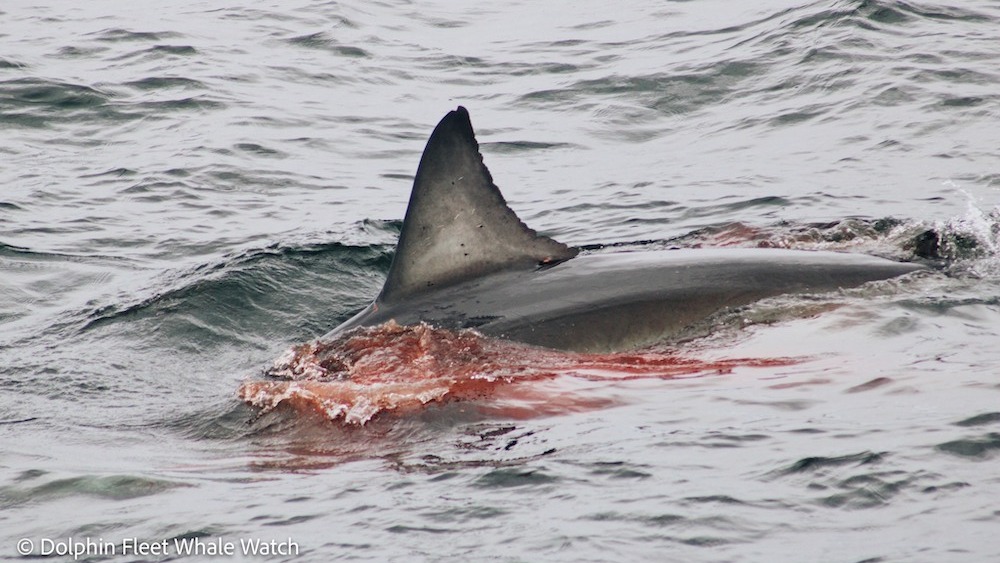Watch a great white shark devour a seal off the coast of Cape Cod, shocking nearby whale watchers
A video that captures a shark attacking a gray seal is going viral and marks the first great white shark sighting of the season in Cape Cod.

Get the world’s most fascinating discoveries delivered straight to your inbox.
You are now subscribed
Your newsletter sign-up was successful
Want to add more newsletters?

Delivered Daily
Daily Newsletter
Sign up for the latest discoveries, groundbreaking research and fascinating breakthroughs that impact you and the wider world direct to your inbox.

Once a week
Life's Little Mysteries
Feed your curiosity with an exclusive mystery every week, solved with science and delivered direct to your inbox before it's seen anywhere else.

Once a week
How It Works
Sign up to our free science & technology newsletter for your weekly fix of fascinating articles, quick quizzes, amazing images, and more

Delivered daily
Space.com Newsletter
Breaking space news, the latest updates on rocket launches, skywatching events and more!

Once a month
Watch This Space
Sign up to our monthly entertainment newsletter to keep up with all our coverage of the latest sci-fi and space movies, tv shows, games and books.

Once a week
Night Sky This Week
Discover this week's must-see night sky events, moon phases, and stunning astrophotos. Sign up for our skywatching newsletter and explore the universe with us!
Join the club
Get full access to premium articles, exclusive features and a growing list of member rewards.
A whale watching tour group off the coast of Provincetown, Massachusetts, got the view of a lifetime when a great white shark swam up to the boat and proceeded to attack and eat a seal — and the entire grisly scene was caught on video.
The predation event unfolded over the course of seven minutes on Saturday (May 20) during a tour hosted by Dolphin Fleet Whale Watch.
In a video captured by a member of the group and posted on Facebook, a 12-foot-long (4 meters) great white shark (Carcharodon carcharias) can be seen prowling near the boat. Then, suddenly, a juvenile gray seal (Halichoerus grypus) pops out of the water, only for the shark to snap it in two with its razor-sharp teeth.
"While we have a healthy population of great whites and seals on Cape Cod, predation events like this are not often sighted," Dolphin Fleet Whale Watch representatives wrote in the Facebook post. "This is the first time our crew has seen a predation in all of our collective years on the water."
Related: In rare attack, great white shark decapitates diver in Mexico. But why?
In a statement, the New England Aquarium confirmed that this marked the first great white shark sighting of the season in Cape Cod.
During the summer, it's common for great white sharks to congregate off the coast of Cape Cod due to the abundance of gray seals living there, according to the Massachusetts Shark Research Program. These marine mammals were nearly wiped out by the mid-20th century due to hunting, but the 1972 Marine Mammal Protection Act helped gray seals rebound.
Get the world’s most fascinating discoveries delivered straight to your inbox.
Once gray seal numbers increased, so did the number of great white sharks feeding on them, according to National Oceanic and Atmospheric Administration (NOAA) Fisheries.
"Though white shark bites on humans are rare, this sighting serves as a reminder to beachgoers and boaters to be mindful of the presence of these ocean animals," John Chisholm, an adjunct scientist with the Anderson Cabot Center for Ocean Life at the New England Aquarium, said in the statement. "It's important to be aware of sharks' presence in shallow waters, to avoid where seals are present or schools of fish are visible and to stay close to shore when rescuers can reach you if needed."
The sighting was also documented on the Atlantic White Shark Conservancy's Sharktivity app, according to the statement.
Jennifer Nalewicki is former Live Science staff writer and Salt Lake City-based journalist whose work has been featured in The New York Times, Smithsonian Magazine, Scientific American, Popular Mechanics and more. She covers several science topics from planet Earth to paleontology and archaeology to health and culture. Prior to freelancing, Jennifer held an Editor role at Time Inc. Jennifer has a bachelor's degree in Journalism from The University of Texas at Austin.
 Live Science Plus
Live Science Plus










